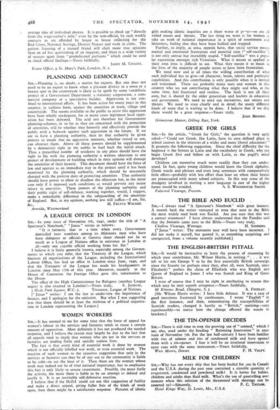WOMEN WORKERS
SIR,—It has seemed to me for some time that the force of appeal for women's labour in the services and factories tends to rouse a certain amount of opposition. Most definitely it has not produced the needed response, and I believe the reason may largely be due to the fact that all appeals tend to imply that women who are not in the services or factories are leading futile and socially useless lives.
The fact is that every kind of essential work is done by women which is not officially labelled war work, or even essential work. The reaction of such women to the ceaseless suggestion that only in the services or factories can they be of any use to the community is liable to be cold—to say the least of it. Then there are the women whose work may indeed not be of vital national importance, but to emphasise this fact is only likely to arouse resentment. Possibly, the more futile the activity, the more there is liable to be an attempt to defend and justify it. It is an inevitable self-defensive reaction.
I believe that if the M.O.I. could cut out this suggestion of futility and make a direct appeal, giving fuller lists of the kinds of work open, then there might be a satisfactory response. Pictures of idiotic girls making idiotic inquiries are a sheer waste of pr-er—so are all veiled sneers and threats. The last thing we want is for women to take on work of national importance in a spirit of resentment and bitterness, feeling that they have been bullied and trapped.
Further, to imply, as some appeals have, that social service means mental and emotional frustration and material ruin (" self-sacrifice ") is not only untrue but incredibly stupid. " Self-sacrifice " was a popu- lar expression amongst rich Victorians. What it meant as applied to their own lives is difficult to see. What they meant it to mean in the lives of the majority of people seems to have been frustration.
We need now and at all times the willing contribution of what each individual has to give—of character, brain, talents and particular capabilities. And•this contribution is only possible when it is invited and welcomed. There are probably many men and women in this country who are not contributing what they might and who, at the same time, feel frustrated and restless. The fault is not all their own, but is shared by the older generation and leaders in education and government. We need to send out invitations, not sneers and threats. We need to state clearly and in detail .the many different kinds of worK that is waiting to be done. I believe that if we did, there would be a great response.—Yours truly, JOAN BROOKE.
Grimstone Manor, Gilling East, York.






















 Previous page
Previous page